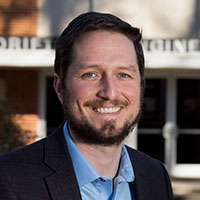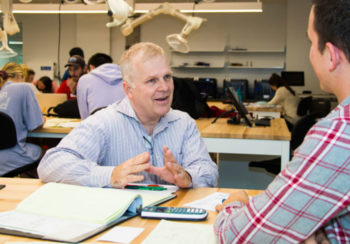The global challenges of the 21st century are becoming more complex and involved.
Whether it’s sustaining adequate food and water supplies or solving social and technical problems, these issues have a staggering impact across many countries. At the forefront of pursuing solutions is the University of Georgia, which is working to bring valuable insights and effective problem-solving to the table starting with empathetic engineers.
In an industry typified by technical competencies and trade skills, UGA requires as part of every mechanical engineering degree a course on empathy. The goal is to instill in students compassion for clients and to help them consider not only the effectiveness of their projects but also the possible unintended consequences on others. This focus is part of a National Science Foundation-funded research collaboration between UGA’s College of Engineering and its School of Social Work.
According to Joachim Walther, associate professor of engineering education, this emphasis on empathy is a first not only for the university but also among programs of its kind around the world. And while Georgia’s comprehensive program is one of the youngest in the nation, the university is seizing an opportunity to be a national leader in engineering education, changing the way the discipline is usually perceived: impersonal and emotionless.
“As an engineer, if you can approach these messy social and technical problems by interacting with people with authenticity and genuineness, you can get a fuller picture of what the challenge is and how engineering can play a role,” says Walther.
“When I ask students early on in their degree why they want to be an engineer, they say they want to save the world. Hopefully, my work will prepare them to do just that.”
– Joachim Walther, Associate Professor of Engineering
As these global issues increase in complexity, so do their solutions. With this in mind, UGA is committed to training engineers who understand contributions from other disciplines and who comprehend a problem’s cultural and social implications.
Walther frames it this way, “Without exception, these challenges require us to work with different kinds of people, and we need engineers to be able to navigate these spaces. Thinking this way could change the face of how engineering works in practice, creating a different type of engineer who works with and for the people.”
Developing this approach to educating engineers is part of a broader effort in the College of Engineering to create a culture around educational innovation. The Engineering Education Transformations Institute was established in 2017 to fuse fundamental engineering education research with teaching innovations.
Not only is approach preparing future engineers to navigate complex social and cultural spaces, but it could also open the doors to a more diverse industry, not only in gender, race, and ethnicity but also in ways of thinking about the world.
“More diverse groups could participate in and enrich this discipline, transforming the role engineering plays in addressing 21st-century challenges,” Walther says. “When I ask students early on in their degree why they want to be an engineer, they say they want to save the world. Hopefully, my work will prepare them to do just that.”

About the Researcher
Joachim Walther
Associate Professor
School of Environmental, Civil, Agricultural and Mechanical Engineering
College of Engineering





